- Home
- J. R. R. Tolkien
Unfinished Tales Page 19
Unfinished Tales Read online
Page 19
Then Glaurung, feeling his death-pang, gave forth a scream, whereat all the woods were shaken, and the watchers at Nen Girith were aghast. Turambar reeled as from a blow, and slipped down, and his sword was torn from his grasp, and clave to the belly of the Dragon. For Glaurung in a great spasm bent up all his shuddering bulk and hurled it over the ravine, and there upon the further shore he writhed, screaming, lashing and coiling himself in his agony, until he had broken a great space all about him, and lay there at last in a smoke and a ruin, and was still.
Now Turambar clung to the roots of the tree, stunned and well-nigh overcome. But he strove against himself and drove himself on, and half sliding and half climbing he came down to the river, and dared again the perilous crossing, crawling now on hands and feet, clinging, blinded with spray, until he came over at last, and climbed wearily up by the cleft by which they had descended. Thus he came at length to the place of the dying Dragon, and he looked on his stricken enemy without pity, and was glad.
There now Glaurung lay, with jaws agape; but all his fires were burned out, and his evil eyes were closed. He was stretched out in his length, and had rolled upon one side, and the hilts of Gurthang stood in his belly. Then the heart of Turambar rose high within him, and though the Dragon still breathed he would recover his sword, which if he prized it before was now worth to him all the treasure of Nargothrond. True proved the words spoken at its forging that nothing, great or small, should live that once it had bitten.
Therefore going up to his foe he set foot upon his belly, and seizing the hilts of Gurthang he put forth his strength to withdraw it. And he cried in mockery of Glaurung’s words at Nargothrond: ‘Hail, Worm of Morgoth! Well met again! Die now and the darkness have thee! Thus is Túrin son of Húrin avenged.’ Then he wrenched out the sword, and even as he did so a spout of black blood followed it, and fell upon his hand, and his flesh was burned by the venom, so that he cried aloud at the pain. Thereat Glaurung stirred and opened his baleful eyes and looked upon Turambar with such malice that it seemed to him that he was smitten by an arrow; and for that and for the anguish of his hand he fell in a swoon, and lay as one dead beside the Dragon, and his sword was beneath him.
Now the screams of Glaurung came to the people at Nen Girith, and they were filled with terror; and when the watchers beheld from afar the great breaking and burning that the Dragon made in his throes, they believed that he was trampling and destroying those that had assailed him. Then indeed they wished the miles longer that lay between them; but they dared not leave the high place where they were gathered, for they remembered the words of Turambar that, if Glaurung conquered, he would go first to Ephel Bran-dir. Therefore they watched in fear for any sign of his movement, but none were so hardy as to go down and seek for tidings in the place of the battle. And Níniel sat, and did not move, save that she shuddered and could not still her limbs; for when she heard the voice of Glaurung her heart died within her, and she felt her darkness creeping upon her again.
Thus Brandir found her. For he came at last to the bridge over Celebros, slow and weary; all the long way alone he had limped on his crutch, and it was five leagues at the least from his home. Fear for Níniel had driven him on, and now the tidings that he learned were no worse than he had dreaded. ‘The Dragon has crossed the river,’ men told him, ‘and the Black Sword is surely dead, and those that went with him.’ Then Brandir stood by Níniel, and guessed her misery, and he yearned to her; but he thought nonetheless: ‘The Black Sword is dead, and Níniel lives.’ And he shuddered, for suddenly it seemed cold by the waters of Nen Girith; and he cast his cloak about Níniel. But he found no words to say; and she did not speak.
Time passed, and still Brandir stood silent beside her, peering into the night and listening; but he could see nothing, and could hear no sound but the falling of the waters of Nen Girith, and he thought: ‘Now surely Glaurung is gone and has passed into Brethil.’ But he pitied his people no more, fools that had flouted his counsel, and had scorned him. ‘Let the Dragon go to Amon Obel, and there will be time then to escape, to lead Níniel away.’ Whither, he scarce knew, for he had never journeyed beyond Brethil.
At last he bent down and touched Níniel on the arm, and said to her: ‘Time passes, Níniel! Come! It is time to go. If you will let me, I will lead you.’
Then silently she arose, and took his hand, and they passed over the bridge and went down the path that led to the Crossings of Teiglin. But those that saw them moving as shadows in the dark knew not who they were, and cared not. And when they had gone some little way through the silent trees, the moon rose beyond Amon Obel, and the glades of the forest were filled with a grey light. Then Níniel halted and said to Brandir: ‘Is this the way?’
And he answered: ‘What is the way? For all our hope in Brethil is ended. We have no way, save to escape the Dragon, and flee far from him while there is yet time.’
Níniel looked at him in wonder and said: ‘Did you not offer to lead me to him? Or would you deceive me? The Black Sword was my beloved and my husband, and only to find him do I go. What else could you think? Now do as you will, but I must hasten.’
And even as Brandir stood a moment amazed, she sped from him; and he called after her, crying: ‘Wait, Níniel! Go not alone! You know not what you will find. I will come with you!’ But she paid no heed to him, and went now as though her blood burned her, which before had been cold; and though he followed as he could she passed soon out of his sight. Then he cursed his fate and his weakness; but he would not turn back.
Now the moon rose white in the sky, and was near the full, and as Níniel came down from the upland towards the land near the river, it seemed to her that she remembered it, and feared it. For she was come to the Crossings of Teiglin, and Haudh-en-Elleth stood there before her, pale in the moonlight, with a black shadow cast athwart it; and out of the mound came a great dread.
Then she turned with a cry and fled south along the river, and cast her cloak as she ran, as though casting off a darkness that clung to her; and beneath she was all clad in white, and she shone in the moon as she flitted among the trees. Thus Brandir above on the hill-side saw her, and turned to cross her course, if he could; and finding by fortune the narrow path that Turambar had used, for it left the more beaten road and went steeply down southward to the river, he came at last close behind her again. But though he called, she did not heed, or did not hear, and soon once more she passed on ahead; and so they drew near to the woods beside Cabeden-Aras and the place of the agony of Glaurung.
The moon then was riding in the South unclouded, and the light was cold and clear. Coming to the edge of the ruin that Glaurung had wrought, Níniel saw his body lying there, and his belly grey in the moon-sheen; but beside him lay a man. Then forgetting her fear she ran on amid the smouldering wrack and so came to Turambar. He was fallen on his side, and his sword lay beneath him, but his face was wan as death in the white light. Then she threw herself down by him weeping, and kissed him; and it seemed to her that he breathed faintly, but she thought it but a trickery of false hope, for he was cold, and did not move, nor did he answer her. And as she caressed him she found that his hand was blackened as if it had been scorched, and she washed it with her tears, and tearing a strip from her raiment she bound it about. But still he did not move at her touch, and she kissed him again, and cried aloud: ‘Turambar, Turambar, come back! Hear me! Awake! For it is Níniel. The Dragon is dead, dead, and I alone am here by you.’ But he answered nothing.
Her cry Brandir heard, for he had come to the edge of the ruin; but even as he stepped forward towards Níniel, he was halted, and stood still. For at the cry of Níniel Glaurung stirred for the last time, and a quiver ran through all his body; and he opened his baleful eyes a slit, and the moon gleamed in them, as gasping he spoke:
‘Hail, Nienor, daughter of Húrin. We meet again ere the end. I give thee joy that thou hast found thy brother at last. And now thou shalt know him: a stabber in the dark, treacherous to foes, faith
less to friends, and a curse unto his kin, Túrin son of Húrin! But the worst of all his deeds thou shalt feel in thyself.’
Then Nienor sat as one stunned, but Glaurung died; and with his death the veil of his malice fell from her, and all her memory grew clear before her, from day unto day, neither did she forget any of those things that had befallen her since she lay on Haudh-en-Elleth. And her whole body shook with horror and anguish. But Brandir, who had heard all, was stricken, and leaned against a tree.
Then suddenly Nienor started to her feet, and stood pale as a wraith in the moon, and looked down on Túrin, and cried: ‘Farewell, O twice beloved! A Túrin Turambar turún’ ambartanen: master of doom by doom mastered! O happy to be dead!’ Then distraught with woe and the horror that had overtaken her she fled wildly from that place; and Brandir stumbled after her, crying: ‘Wait! Wait, Níniel!’
One moment she paused, looking back with staring eyes. ‘Wait?’ she cried. ‘Wait? That was ever your counsel. Would that I had heeded! But now it is too late. And now I will wait no more upon Middle-earth.’ And she sped on before him. 27
Swiftly she came to the brink of Cabed-en-Aras, and there stood and looked on the loud water crying: ‘Water, water! Take now Níniel Nienor daughter of Húrin; Mourning, Mourning daughter of Morwen! Take me and bear me down to the Sea!’ With that she cast herself over the brink: a flash of white swallowed in the dark chasm, a cry lost in the roaring of the river.
The waters of Teiglin flowed on, but Cabed-en-Aras was no more: Cabed Naeramarth thereafter it was named by men; for no deer would ever leap there again, and all living things shunned it, and no man would walk upon its shore. Last of men to look down into its darkness was Brandir son of Handir; and he turned away in horror, for his heart quailed, and though he hated now his life, he could not there take the death that he desired. 28 Then his thought turned to Túrin Turambar, and he cried: ‘Do I hate you, or do I pity you? But you are dead. I owe you no thanks, taker of all that I had or would have. But my people owe you a debt. It is fitting that from me they should learn it.’
And so he began to limp back to Nen Girith, avoiding the place of the Dragon with a shudder; and as he climbed the steep path again he came on a man that peered through the trees, and seeing him drew back. But he had marked his face in a gleam of the sinking moon.
‘Ha, Dorlas!’ he cried. ‘What news can you tell? How came you off alive? And what of my kinsman?’
‘I know not,’ answered Dorlas sullenly.
‘Then that is strange,’ said Brandir.
‘If you will know,’ said Dorlas, ‘the Black Sword would have us ford the races of Teiglin in the dark. Is it strange that I could not? I am a better man with an axe than some, but I am not goat-footed.’
‘So they went on without you to come at the Dragon?’ said Brandir. ‘But how when he passed over? At the least you would stay near, and would see what befell.’
But Dorlas made no answer, and stared only at Brandir with hatred in his eyes. Then Brandir understood, perceiving suddenly that this man had deserted his companions, and unmanned by shame had then hidden in the woods. ‘Shame on you, Dorlas!’ he said. ‘You are the begetter of our woes: egging on the Black Sword, bringing the Dragon upon us, putting me to scorn, drawing Hunthor to his death, and then you flee to skulk in the woods!’ And as he spoke another thought entered his mind, and he said in great anger: ‘Why did you not bring tidings? It was the least penance that you could do. Had you done so, the Lady Níniel would have had no need to seek them herself. She need never have seen the Dragon. She might have lived. Dorlas, I hate you!’
‘Keep your hate!’ said Dorlas. ‘It is as feeble as all your counsels. But for me the Orcs would have come and hung you as a scarecrow in your own garden. Take the name skulker to yourself !’ And with that, being for his shame the readier to wrath, he aimed a blow at Brandir with his great fist, and so ended his life, before the look of amazement left his eyes: for Brandir drew his sword and hewed him his death-blow. Then for a moment he stood trembling, sickened by the blood; and casting down his sword he turned, and went on his way, bowed upon his crutch.
As Brandir came to Nen Girith the pallid moon was gone down, and the night was fading; morning was opening in the East. The people that cowered there still by the bridge saw him come like a grey shadow in the dawn, and some called to him in wonder: ‘Where have you been? Have you seen her? For the Lady Níniel is gone.’
‘Yes, she is gone,’ he said. ‘Gone, gone, never to return! But I am come to bring you tidings. Hear now, people of Brethil, and say if there was ever such a tale as the tale that I bear! The Dragon is dead, but dead also is Turambar at his side. And those are good tidings: yes, both are good indeed.’
Then the people murmured, wondering at his speech, and some said that he was mad; but Brandir cried: ‘Hear me to the end! Níniel too is dead, Níniel the fair whom you loved, whom I loved dearest of all. She leaped from the brink of the Deer’s Leap, 29 and the teeth of Teiglin have taken her. She is gone, hating the light of day. For this she learned before she fled: Húrin’s children were they both, sister and brother. The Mormegil he was called, Turambar he named himself, hiding his past: Túrin son of Húrin. Níniel we named her, not knowing her past: Nienor she was, daughter of Húrin. To Brethil they brought their dark doom’s shadow. Here their doom has fallen, and of grief this land shall never again be free. Call it not Brethil, not the land of the Halethrim, but Sarchnia Hîn Húrin, Grave of the Children of Húrin!’
Then though they did not understand yet how this evil had come to pass, the people wept as they stood, and some said: ‘A grave there is in Teiglin for Níniel the beloved, a grave there shall be for Turambar, most valiant of men. Our deliverer shall not be left to lie under the sky. Let us go to him.’
The Death of Túrin
Now even as Níniel fled away, Túrin stirred, and it seemed to him that out of his deep darkness he heard her call to him far away; but as Glaurung died, the black swoon left him, and he breathed deep again, and sighed, and passed into a slumber of great weariness. But ere dawn it grew bitter cold, and he turned in his sleep, and the hilts of Gurthang drove into his side, and suddenly he awoke. Night was going, and there was a breath of morning in the air; and he sprang to his feet, remembering his victory, and the burning venom on his hand. He raised it up, and looked at it, and marvelled. For it was bound about with a strip of white cloth, yet moist, and it was at ease; and he said to himself: ‘Why should one tend me so, and yet leave me here to lie cold amid the wrack and the dragon-stench? What strange things have chanced?’
Then he called aloud, but there was no answer. All was black and drear about him, and there was a reek of death. He stooped and lifted his sword, and it was whole, and the light of its edges was undimmed. ‘Foul was the venom of Glaurung,’ he said, ‘but you are stronger than I, Gurthang! All blood will you drink. Yours is the victory. But come! I must go seek for aid. My body is weary, and there is a chill in my bones.’
Then he turned his back upon Glaurung and left him to rot; but as he passed from that place each step seemed more heavy, and he thought: ‘At Nen Girith, maybe, I will find one of the scouts awaiting me. But would I were soon in my own house, and might feel the gentle hands of Níniel, and the good skill of Brandir!’ And so at last, walking wearily, leaning on Gurthang, through the grey light of early day he came to Nen Girith, and even as men were setting forth to seek his dead body, he stood before the people.
Then they gave back in terror, believing that it was his unquiet spirit, and the women wailed and covered their eyes. But he said: ‘Nay, do not weep, but be glad! See! Do I not live? And have I not slain the Dragon that you feared?’
Then they turned upon Brandir, and cried: ‘Fool, with your false tales, saying that he lay dead. Did we not say that you were mad?’ But Brandir was aghast, and stared at Túrin with fear in his eyes, and he could say nothing.
But Túrin said to him: ‘It was you then that were there, and tende
d my hand? I thank you. But your skill is failing, if you cannot tell swoon from death.’ Then he turned to the people: ‘Speak not so to him, fools all of you. Which of you would have done better? At least he had the heart to come down to the place of battle, while you sit wailing!
‘But now, son of Handir, come! There is more that I would learn. Why are you here, and all this people, whom I left at the Ephel? If I may go into the peril of death for your sakes, may I not be obeyed when I am gone? And where is Níniel? At the least I may hope that you did not bring her hither, but left her where I bestowed her, in my house, with true men to guard it?’
And when no one answered him, ‘Come, say where is Níniel?’ he cried. ‘For her first I would see; and to her first will I tell the tale of the deeds in the night.’
But they turned their faces from him, and Brandir said at last: ‘Níniel is not here.’
‘That is well then,’ he said. ‘Then I will go to my home. Is there a horse to bear me? Or a bier would be better. I faint with my labours.’
‘Nay, nay!’ said Brandir in anguish. ‘Your house is empty. Níniel is not there. She is dead.’
But one of the women – the wife of Dorlas, who loved Brandir little – cried shrilly: ‘Pay no heed to him, lord! For he is crazed. He came crying that you were dead, and called it good tidings. But you live. Why then should his tale of Níniel be true: that she is dead, and yet worse?’
Then Túrin strode towards Brandir: ‘So my death was good tidings?’ he cried. ‘Yes, ever you did begrudge her to me, that I knew. Now she is dead, you say. And yet worse? What lie have you begotten in your malice, Club-foot? Would you slay us then with foul words, since you can wield no other weapon?’

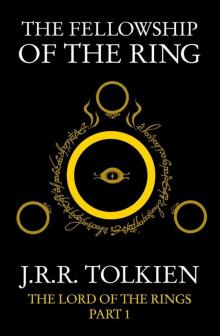 The Fellowship of the Ring
The Fellowship of the Ring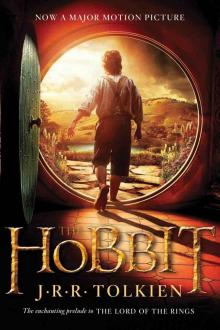 The Hobbit
The Hobbit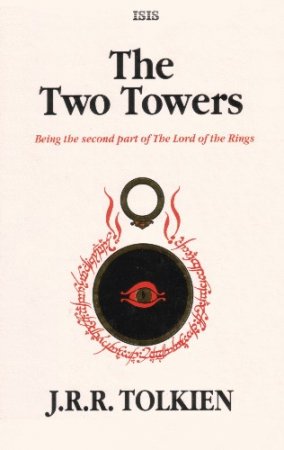 The Two Towers
The Two Towers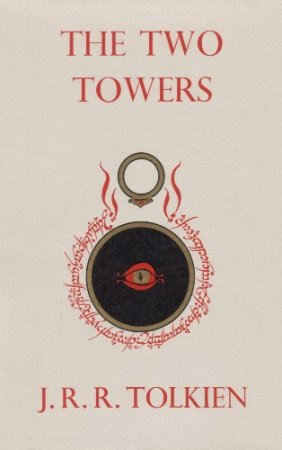 The Return of the King
The Return of the King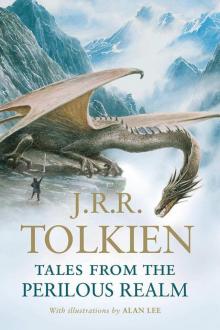 Tales From the Perilous Realm
Tales From the Perilous Realm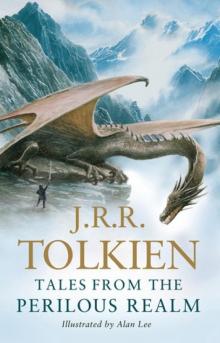 Leaf by Niggle
Leaf by Niggle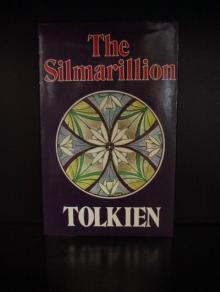 The Silmarillon
The Silmarillon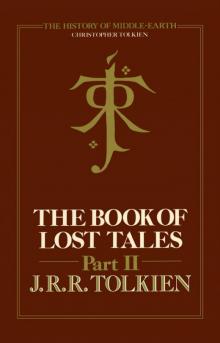 The Book of Lost Tales, Part Two
The Book of Lost Tales, Part Two The Book of Lost Tales, Part One
The Book of Lost Tales, Part One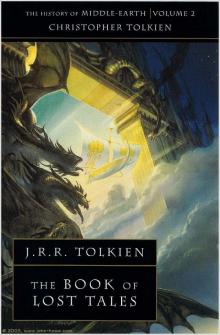 The Book of Lost Tales 2
The Book of Lost Tales 2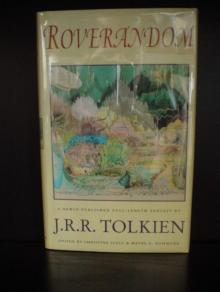 Roverandom
Roverandom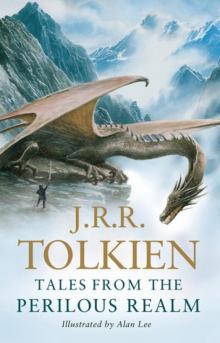 Smith of Wootton Major
Smith of Wootton Major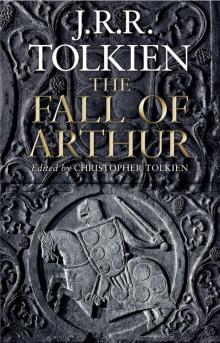 The Fall of Arthur
The Fall of Arthur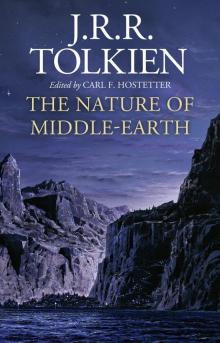 The Nature of Middle-earth
The Nature of Middle-earth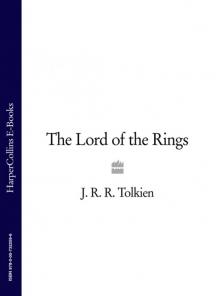 The Lord of the Rings: The Fellowship of the Ring, The Two Towers, The Return of the King
The Lord of the Rings: The Fellowship of the Ring, The Two Towers, The Return of the King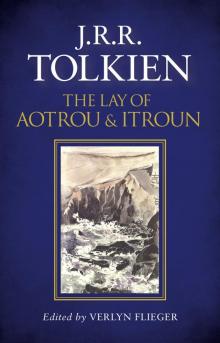 The Lay of Aotrou and Itroun
The Lay of Aotrou and Itroun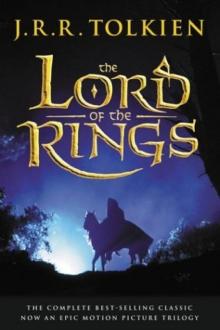 lord_rings.qxd
lord_rings.qxd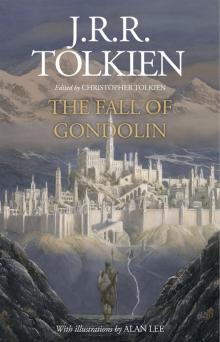 The Fall of Gondolin
The Fall of Gondolin The Book of Lost Tales, Part 1
The Book of Lost Tales, Part 1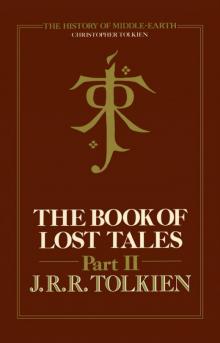 The Book of Lost Tales, Part 2
The Book of Lost Tales, Part 2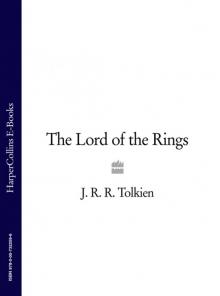 The Lord of the Rings
The Lord of the Rings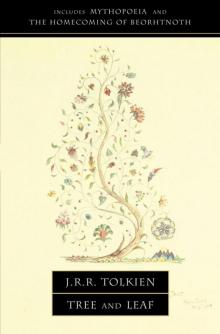 Tree and Leaf
Tree and Leaf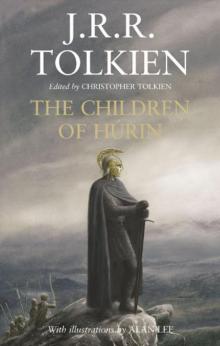 The Children of Húrin
The Children of Húrin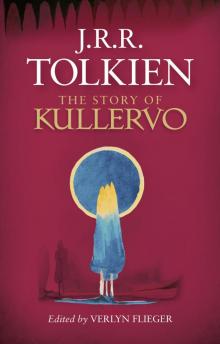 The Story of Kullervo
The Story of Kullervo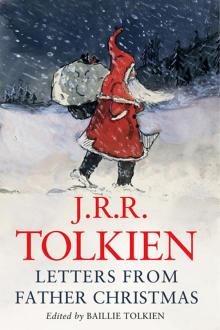 Letters From Father Christmas
Letters From Father Christmas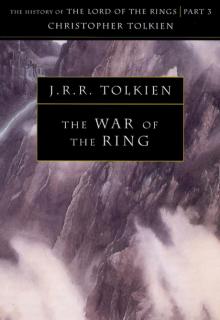 The History of Middle Earth: Volume 8 - The War of the Ring
The History of Middle Earth: Volume 8 - The War of the Ring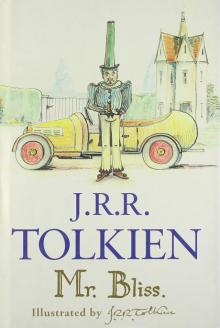 Mr. Bliss
Mr. Bliss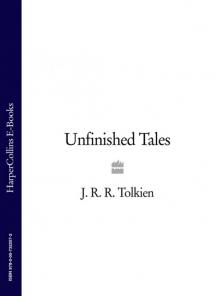 Unfinished Tales
Unfinished Tales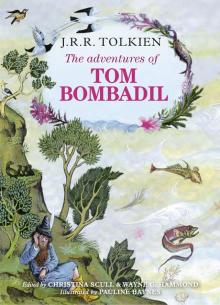 The Adventures of Tom Bombadil
The Adventures of Tom Bombadil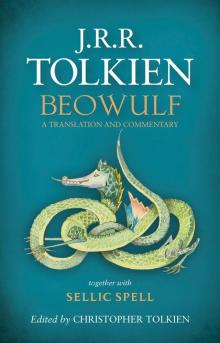 Beowulf: A Translation and Commentary, together with Sellic Spell
Beowulf: A Translation and Commentary, together with Sellic Spell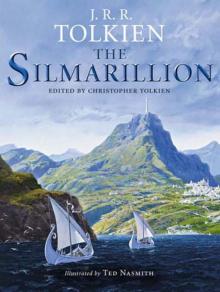 The Silmarillion
The Silmarillion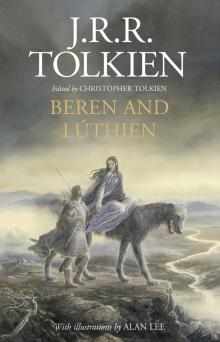 Beren and Lúthien
Beren and Lúthien